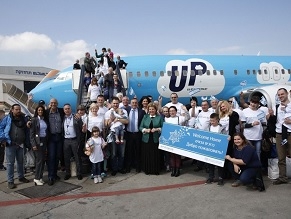|
World Jewish News

Ukrainians immigrants arrive in Israel. (photo credit:OLIVIA FITUSSI)
|
Russian agression continues to drive Ukrainians to Israel
28.03.2017, Repatriation Some 230 Ukrainian immigrants landed in Israel on Tuesday morning, the latest in a steady stream from the country, which has suffered from a crippled economy since the War in Donbass broke out in April 2014.
Some of the olim fled from conflict-stricken areas and have lived as refugees in other areas of the country in recent years.
According to Jewish Agency and Aliyah and Absorption Ministry statistics, some 19,000 Ukrainians have made aliya since 2014, the year the conflict broke out. The peak was in 2015, with 7,400 Ukrainians moving to Israel. From 2013 to 2014, the number of Ukrainian olim almost tripled, jumping from some 2,020 to 5,900, and the Jewish Agency observed an upsurge in queries and applications for aliya since the beginning of the crisis.
In December 2014, the International Fellowship of Christians and Jews launched its Freedom Flight program, chartering aliya flights independently from the Jewish Agency. It was with the IFCJ that Tuesday’s olim arrived, with bright hopes for their new lives in Israel.
“Israel is my home,” Lavrinenko Alexander told The Jerusalem Post, during a welcome ceremony at Ben-Gurion Airport attended by Immigration and Absorption Minister Sofa Landver, who is herself an olah from the Former Soviet Union.
Though it was the first time Alexander had set foot in the country, he was joining his siblings who had already made the move. Alexander hails from the city of Zaporozhye, located next to Donbass. He has felt the conflict most keenly via its economic impact. “There is no future for my children [there],” he said. Alexander, 27, is joined in Israel by his 24-year-old wife and two-year-old son. Having heard about the experiences of his family in Ramle, he is positive that Israel will provide a better life for his family.
This seems to be the general consensus among the olim. “We decided to come to this country and make a new life – we hope it will be better than in Ukraine,” said 30-year-old Olga Shevtosa of Krivoy Rog, who is pregnant with her first child. “We feel that in our country there is war,” she said, adding that the economic and political situations are dire and that work is hard to come by.
The IFCJ provides financial and social support for olim after they arrive in Israel to help them integrate into the country, and Shevtosa feels encouraged by the assistance she will receive. The olim receive this aid in addition to the benefits provided to olim by the Immigration and Absorption Ministry.
The group of new arrivals consists of 78 families, four Holocaust survivors and over 40 children. Among them was 10-year-old Daniel Alekseenko, who acted a as translator for his family. “I am very excited to be in Israel,” Alekseenko told the Post. His family made aliya to Rehovot from Krivoy Rog, and Daniel will be reunited with his aunt and grandmother, who made aliya 20 years ago. His parents, Natalia and Evan, who also have a five-year-old child, point to inflation and instability, explaining that the recent political situation in Ukraine made it difficult to raise young children there. “Any new change brings new opportunities,” Natalia said optimistically.
In a statement, IFCJ president Rabbi Yechiel Eckstein said: “The olim who join us today carry with them the burden of civil war, and no less of economic war.” Mentioning the upcoming Passover holiday, the “festival of freedom,” Eckstein called on the Jewish people to open their homes to the olim.
By Tamara Zieve
JPost.com
|
|
